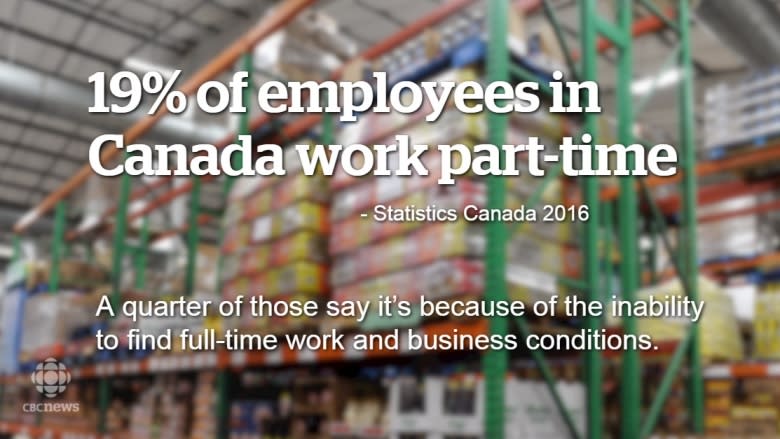Hard at Work: 'Part-time staff being taken advantage of' at Food Basics, claims worker
On paper, you're called a part-time worker. In reality, your duties, responsibilities and hours are those of a full-time worker — with one glaring difference — much less money.
As part of our Hard at Work series, we're looking at how employees in Ontario could benefit from changes being considered to the Employment Standards Act. CBC Toronto first told you in February about the changes that could overhaul workplace rules in Ontario. Since then, thousands of people have commented on the stories and hundreds more have written to us with their workplace horror stories.
'Unfair and abusive'
A night-time grocery clerk at Food Basics emailed CBC Toronto claiming the pay disparity practices there are "unfair and abusive."
"I don't believe in being paid less for the same job, in women being paid less than men, part-timers being paid less than full-timers," the grocery clerk said when we met at the worker's home in the GTA.
Despite being classified a part-time worker on paper, the grocery clerk gave CBC paystubs that showed consistent work weeks of 40 hours. The clerk says they're scheduled often to "keep up with the workload at the store."
The hourly rate for part-timers is less than that of full-timers and the difference in take-home pay can be big — the grocery clerk says the extra money would help a lot because "it's not cheap living here."
As the province looks to reform the Employment Standards Act, one of the options it's considering would require employers to pay their part-time workers the same as full-time workers doing similar jobs.
Same job, different pay
The grocery clerk doesn't mind the work, but does find it "unfair."
"I would have no problem being paid less if I was doing less," they said. "I'm working just as hard and the company expects me to come in and put in the same effort as a full-timer does for the time I'm there… and yet, chooses to pay me 30 per cent less."
Metro Inc., the company that owns the chain of Food Basics stores, refused to comment on the situation, saying they do not talk about "labour relations matters in the press."
Tim Deelstra with
UFCW Local 175, the union that represents
more than 7,000 Food Basics employees in the GTA, confirmed part-time workers earn less than full-time workers by providing a copy of the collective agreement.
Deelstra strongly urges workers who feel they are not being treated fairly to contact their union. There is a provision in the collective agreement stating that "part-time employees will not be scheduled to work in excess of 24 hours per week."
"This is an issue across the industry," said Angelo DiCaro of Unifor, a union that also represents grocery store employees in the province.
DiCaro estimates between 80 to 90 per cent of their grocery store worker membership is employed part-time. The reason for this, says Keith Osborne, retail director for Unifor is clear — "cost savings."
DiCaro adds their union is actively working to address "the chronic problem of over-use of part-time workers" in the retail industry.
'Equal pay for equal work'
The grocery clerk's situation is a common one across the working world, says Deena Ladd, director of the Worker's Action Centre, a labour rights advocacy group.
The group is pushing for what she calls "equal pay for equal work" to make sure that no matter how you're hired or who your employer is, that you get paid the same as someone who is doing your job.
She wants to see legislation passed so employers "can't just hire a whole bunch of part-time workers or a whole bunch of casual or relief workers and pay them half as much as someone doing their regular job."
Through her centre, Ladd says it's common for a employers to pay workers $23 an hour, but only pay relief or temp agency workers $13 an hour for the same work. This "sends a message to employers that you can hire people at a less rate than your employees," she said.
She also raises concern that minimum wage has become the norm for many jobs, but minimum wage is still below the poverty line.
Part-time work growing
According to Statistics Canada, more than 3.4 million people, or 19 per cent of the population was working part-time in 2016 — up 80-thousand from 2015.
A quarter of those people reported working part-time because of business conditions and the inability to find full-time work.
In Ontario alone, there were 1.3 million part-time workers in 2015 and job growth in part-time employment outpaced full-time work over the last 15 years.
According to the ministry, part-timers in Ontario tend to be:
- Predominantly female, representing 66 per cent of part-time workers.
- Recent immigrants, who represented 16 per cent of temporary part-time workers.
The average hourly rate for part-timers in Ontario in 2015 was $12.50, in comparison to $24.04 for full-time employees.
Potential options for part-timers
Some of the suggested changes in the Changing Workplaces Review that would affect part-timers include:
- Part-time, temporary and casual employees would be paid the same as full-time employees in the same job.
- Employers would pay employees more for last-minute changes to employees' schedules.
- Employers should offer additional hours of work to existing part-time employees before hiring new employees.
- Part-time and full-time workers have the same access to scheduling and time-off requests.
- Employers need consent from workers before adding hours or shifts after initial schedule.
Are you a worker who could benefit from changes to Ontario's employment laws? Are you an employer concerned that the changes could harm your business? Send us an email to tell us your story.



